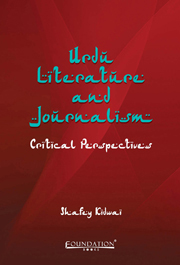Book contents
- Frontmatter
- Dedication
- Contents
- Preface
- Introduction
- Acknowledgements
- 1 Post-Independence Urdu Short Story
- 2 Post-Partition Urdu Poetry
- 3 Structuralism and Post-structuralism in Urdu Criticism
- 4 Jayant Parmar
- 5 Firaq as a Critic
- 6 Ghalib Criticism
- 7 Literature, Culture and Social Consciousness
- 8 The Influence of Tagore on Urdu Literature
- 9 Early Journalistic Endeavours of Sir Syed Ahmad Khan
- 10 Pioneering the First Urdu Book on Journalism
- 11 The Contribution of Urdu Journalists to the First War of Independence
- 12 Abul Kalam Azad's Journalistic Conquests
- Index
8 - The Influence of Tagore on Urdu Literature
Published online by Cambridge University Press: 05 October 2014
- Frontmatter
- Dedication
- Contents
- Preface
- Introduction
- Acknowledgements
- 1 Post-Independence Urdu Short Story
- 2 Post-Partition Urdu Poetry
- 3 Structuralism and Post-structuralism in Urdu Criticism
- 4 Jayant Parmar
- 5 Firaq as a Critic
- 6 Ghalib Criticism
- 7 Literature, Culture and Social Consciousness
- 8 The Influence of Tagore on Urdu Literature
- 9 Early Journalistic Endeavours of Sir Syed Ahmad Khan
- 10 Pioneering the First Urdu Book on Journalism
- 11 The Contribution of Urdu Journalists to the First War of Independence
- 12 Abul Kalam Azad's Journalistic Conquests
- Index
Summary
Urdu, spoken by more than 60 Millions (2001 Census), has usually been, though erroneously, perceived as a language that draws heavily from ‘Erato’ or sensual themes. Seldom does its power of strengthening cultural pluralism by macerating the creative output of a number of eminent writers, get applause from different quarters. Contrary to the widely held view that it regurgitates the themes of many well-known Persian and Arabic poets, Urdu literature, since its inception, keeps an eye on the authors who write in the languages spoken in different parts of India. In line with its age-long resilience, Urdu literature turns its attention to Tagore, whose unmatched creative insight and marked accuracy of sensibility is reflected in poetry, fiction, music, painting, acting and teaching, in equal measure. It goes without saying that the multifaceted personality of Tagore fired the imagination of those who have a panache for good literature.
Much before Tagore won the Nobel Prize, Munshi Premchand, who laid the foundation of fiction in Urdu, referred to him in his letters repeatedly and candidly, admitting that he had learnt the art of juxtaposing the mundane realities of life with eternal questions that constitute the mainstay of human existence, from Tagore. In a letter addressed to Munshi Daya Narain Nigam, dated September 10, 1910, he alludes to one of his unfinished stories that owed much to Tagore.
- Type
- Chapter
- Information
- Urdu Literature and JournalismCritical Perspectives, pp. 115 - 125Publisher: Foundation BooksPrint publication year: 2014



